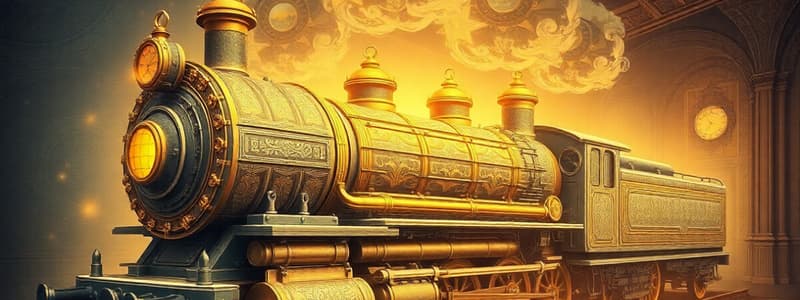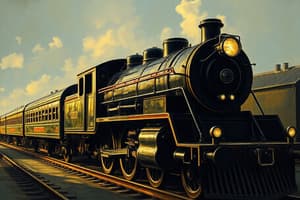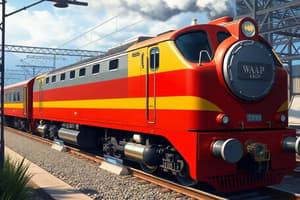Podcast
Questions and Answers
What is the capacity of the cooling system in liters?
What is the capacity of the cooling system in liters?
How high is the locomotive over the cooling hood in meters?
How high is the locomotive over the cooling hood in meters?
What is the maximum speed of the locomotive in kilometers per hour?
What is the maximum speed of the locomotive in kilometers per hour?
Which compartment of the locomotive contains the air brake equipment panel?
Which compartment of the locomotive contains the air brake equipment panel?
Signup and view all the answers
What is the maximum continuous tractive effort of the locomotive in kilonewtons (KN)?
What is the maximum continuous tractive effort of the locomotive in kilonewtons (KN)?
Signup and view all the answers
How many sand boxes are specified for the locomotive?
How many sand boxes are specified for the locomotive?
Signup and view all the answers
Which of the following parts is NOT located in the driver's cab?
Which of the following parts is NOT located in the driver's cab?
Signup and view all the answers
What is the primary function of a turbocharger in a locomotive engine?
What is the primary function of a turbocharger in a locomotive engine?
Signup and view all the answers
What happens to the turbocharger's connection to the engine at full load operation?
What happens to the turbocharger's connection to the engine at full load operation?
Signup and view all the answers
Which component directs exhaust gases onto the turbine wheel blades?
Which component directs exhaust gases onto the turbine wheel blades?
Signup and view all the answers
What mechanical principle drives the turbine rotor in the turbocharger when the engine is under full load?
What mechanical principle drives the turbine rotor in the turbocharger when the engine is under full load?
Signup and view all the answers
What design feature of the turbocharger helps reduce turbulence in the exhaust gas flow?
What design feature of the turbocharger helps reduce turbulence in the exhaust gas flow?
Signup and view all the answers
What is the purpose of the test panel jacks in the electrical control cabinet?
What is the purpose of the test panel jacks in the electrical control cabinet?
Signup and view all the answers
Which components are included in the main generator compartment?
Which components are included in the main generator compartment?
Signup and view all the answers
What does the EM 2000 display panel use to interact with the loco operating crew?
What does the EM 2000 display panel use to interact with the loco operating crew?
Signup and view all the answers
Which of the following components is NOT part of the back panel of the electrical control cabinet?
Which of the following components is NOT part of the back panel of the electrical control cabinet?
Signup and view all the answers
How many DC link transfer switches are mentioned in the context?
How many DC link transfer switches are mentioned in the context?
Signup and view all the answers
What type of panel provides cooling for the components within the electrical cabinet?
What type of panel provides cooling for the components within the electrical cabinet?
Signup and view all the answers
Which component is part of the traction control converter compartment?
Which component is part of the traction control converter compartment?
Signup and view all the answers
What is the main function of the GTO panel in the electrical cabinet?
What is the main function of the GTO panel in the electrical cabinet?
Signup and view all the answers
What type of breakers are included in the circuit breaker panel?
What type of breakers are included in the circuit breaker panel?
Signup and view all the answers
What type of primary filter is used in both locomotives?
What type of primary filter is used in both locomotives?
Signup and view all the answers
Which locomotive has a unit type fuel injection pump and injector without a high-pressure tube?
Which locomotive has a unit type fuel injection pump and injector without a high-pressure tube?
Signup and view all the answers
What is the fuel oil pressure at idle for the Alco locomotive?
What is the fuel oil pressure at idle for the Alco locomotive?
Signup and view all the answers
Which component cools the combustion chamber of the cylinder head in the cooling water system?
Which component cools the combustion chamber of the cylinder head in the cooling water system?
Signup and view all the answers
Which statement is true regarding the secondary filters in both locomotives?
Which statement is true regarding the secondary filters in both locomotives?
Signup and view all the answers
How many engine-mounted water pumps are in the cooling water system?
How many engine-mounted water pumps are in the cooling water system?
Signup and view all the answers
What kind of cooling system is used for the engine in the locomotives?
What kind of cooling system is used for the engine in the locomotives?
Signup and view all the answers
What happens to the outlet water from each cylinder head?
What happens to the outlet water from each cylinder head?
Signup and view all the answers
Which of the following is NOT a part of the cooling water system?
Which of the following is NOT a part of the cooling water system?
Signup and view all the answers
Which locomotive does not have a pressure gauge in its system?
Which locomotive does not have a pressure gauge in its system?
Signup and view all the answers
What is the primary purpose of the fuel oil system in a GM locomotive?
What is the primary purpose of the fuel oil system in a GM locomotive?
Signup and view all the answers
Which component is specifically responsible for cooling the traction motors in a GM locomotive?
Which component is specifically responsible for cooling the traction motors in a GM locomotive?
Signup and view all the answers
What is the function of the Electrical Control Cabinet in a GM locomotive?
What is the function of the Electrical Control Cabinet in a GM locomotive?
Signup and view all the answers
Which component is used for starting the engine in a GM locomotive?
Which component is used for starting the engine in a GM locomotive?
Signup and view all the answers
Which component in the fuel oil system is primarily responsible for removing contaminants from the fuel?
Which component in the fuel oil system is primarily responsible for removing contaminants from the fuel?
Signup and view all the answers
What is the role of the air compressor in the GM locomotive?
What is the role of the air compressor in the GM locomotive?
Signup and view all the answers
What is the purpose of the Lube Oil Cooler in a GM locomotive?
What is the purpose of the Lube Oil Cooler in a GM locomotive?
Signup and view all the answers
Where is the Engine Exhaust Stack located in the GM locomotive?
Where is the Engine Exhaust Stack located in the GM locomotive?
Signup and view all the answers
Which component protects the traction control systems in the GM locomotive?
Which component protects the traction control systems in the GM locomotive?
Signup and view all the answers
What feature aids in the cooling of engine components in a GM locomotive?
What feature aids in the cooling of engine components in a GM locomotive?
Signup and view all the answers
Study Notes
Introduction Handbook on General Motor Diesel Locomotive
- This handbook is for use by diesel shed staff.
- It was prepared by CAMTECH in February 2006.
- The handbook introduces the GM locomotives used by Indian Railways.
- The GM locomotives have been included in the Diesel Locomotive fleet of Indian Railways.
- Production of GM locomotives has already started in DLW, Varanasi.
- The 4000 HP, computer-controlled GM locomotive has special and improved features compared to the Alco design diesel locomotive.
- The book aims to disseminate introductory information about the GM locomotive to those in the field of diesel loco maintenance.
Book Details
- Name: Introduction Handbook On General Motor Diesel Locomotive
- Reference No: IRCAMTECH/2006/M/D/GM loco/1.0
- Edition: First Edition
- Year of publication: 2006
- Target group: Diesel shed's staff
- Revision details: Revision as per requirement
- Total No. of pages: 72
Correction Slips
- Correction slips will be numbered as follows: IRCAMTECH/2006/M/D/GM Loco/1.0/C.S.# XX date, where XX is the serial number of the slip, starting from 01.
Introduction of the GM Locomotive
- The WDG4 & WDP4 series of DLW make locomotives are GM locomotives.
- GT46 MAC model for goods service
- GT46 PAC model for passenger service.
- Equipped with a microprocessor-based computer control system (EM-2000).
- Equipped with a diagnostic display system (DDS) for driver interaction.
- Fitted with 16-cylinder, two stroke Internal combustion engine
- 11% better fuel efficiency compared to ALCO design locomotive.
- 4000 BHP locomotive
- Having highly improved maintainability compared to ALCO locomotive.
General Information Data
- Model Designation: GT46MAC
- Under Truck: CO-CO Type
- Nominal Locomotive Power: 4000HP
- Engine Model (s): 710G3B
- Number of Cylinders: 16
- Engine Type: Two-Stroke, Turbo Charged
- Cylinder Arrangement: 45° "V" Arrangement
- Compression Ratio: 16:1
- Displacement per Cylinder: 11635 cm³ (710 Cu.In)
- Cylinder Bore: 230.19 mm (9-1/16")
- Cylinder Stroke: 279.4 mm (11")
- Rotation (Facing Generator End): Counter-clockwise)
- Full Speed: 904 RPM
- Normal Idle Speed: 269 RPM
- Low Idle Speed: 200 RPM
- Main Generator: TA17-CA6B
- Traction Alternator: TA17
- Companion Alternator: CA6B
- Maximum Voltage: 2600 VDC
Max. Continuos Current, Companion Alternator Output, Auxiliary Generator, Traction Motors, Traction Inverters
- Max Continuous Current: 1250 Ampere
- Companion Alternator Output: 230 VAC, 120 HZ, 250kVA (P. Factor 0.8)
- Auxiliary Generator: 5A-8147, 74 volts DC(Rectified), 18 kW
- Traction Motors: Siemens 1TB-2622-0TA 02, 6 (3 in parallel per bogie)
- Traction Inverters: 1GE420 050 9010.00 MB 74, 1430 kW, 2, per bogie (truck), Voltage Source Inverter With Gate Turn-Off Thyristors
Bogies, Brake Rigging, Air Compressor, Lube Oil Capacity, Batteries
- Bogies: HTSC, 90:17, 3 Wheel Sets per bogie, 1092 mm (43 inches), Single Shoe (16")
- Brake Rigging: Composite, 4 per bogie (truck)
- Air Compressor: WLNA9BB, Two Stage, 3 Cylinders
- Lube Oil Capacity: 10 liters
- Locomotive Storage Batteries: Surrette16CH-25Unitized, 2 Series-connected 16 Cell Lead-Acid Batteries, 32, 64 Volts
Specific Gravity of Electrolyte, 8 Hour Capacity, Supplies/Capacities, Dimensions, Locomotive Speeds/Tractive Effort
- Specific Gravity of Electrolyte: 1.250
- 8 hour Capacity: 500 Amp. Hour
- Lube Oil System Capacity: 950 Liters
- Cooling System capacity: 1045 Liters
- Sand Boxes (8): 0.04M³ box (15ft³/box)
- Fuel Capacity: 6000 Liters
- Height over Cooling Hood: 4.16 M (13' 7.75")
- Height Over Horn: 4.22M (13'10")
- Height over Cab: 3.94 M (12'11")
- Width over handrails: 2.92 M (9' 7.12")
- Width over Under frame: 2.74 M (9'0”)
- Width over Cab: 2.74 M (9'0”)
- Width over Brake Cylinders: 3.07 M (10'1")
- Locomotive Minimum Speeds: Km/h: 22.5
- Locomotive Max Speed (RPM): 120 Km/h
- Maximum Stall tractive Effort: 540 KN
- Max. Continuos Tractive Efforts: 400 KN
- Reduced Tractive Effort Limit: 294 KN
Various Parts and Its Location
- Nose Compartment
- Driver's Cab
- Electrical control cabinet
- Traction Control Converters Compartments
- Main Generator Compartment
- Engine Compartment
- Engine Accessories
- Compressor Compartment
- Radiator Compartment
- Superstructure of locomotive
Cab Control Unit (CCU), Control Stands, Electrical Control Cabinet, Circuit Breaker Panel
- Automatic Brake Handle with 5 positions,
- Independent Brake Handle with 2 positions,
- Engine Run Slide Button Switch,
- GF Slide Button Switch,
- Multiple Push Button Switches,
- Gauge provided on the control stand
Studying That Suits You
Use AI to generate personalized quizzes and flashcards to suit your learning preferences.
Related Documents
Description
Test your knowledge on the specifications and components of locomotive systems with this quiz. Questions cover cooling systems, air brake equipment, turbochargers, and more. Perfect for engineering students and locomotive enthusiasts.




